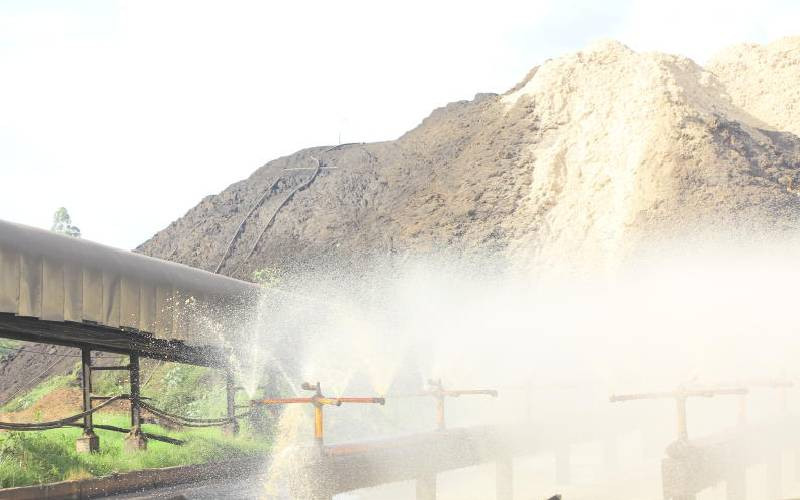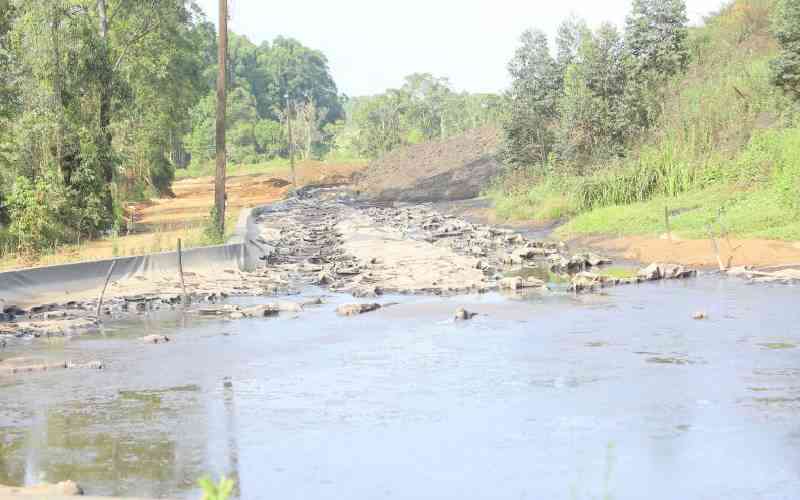
We arrived at Enoosaen shopping centre in Kilgoris, Narok county as the sun sank towards the horizon; the slanting rays of the setting sun gave a warm orange tinge to the sky.
The shadows slipped up the rocks as though the world was drowning in darkness. We retired to bed early since we were tired after a five-hour journey.
But by 6.30 am the following day, we were at Enoosaen primary school. There was a hive of activities at the school with some pupils cleaning the compound while others were attending morning preps.
The sun above was blazing. We saw something floating in the sky when the rising sun casts a rosy hue. The teacher on duty informed us that the dust particles were sugar cane bagasse ash from Transmara Sugar Company. The school is adjacent to the sugar factory.
The strong wind was scary. You can feel your feet move. We stood under a tree next to the dining hall. We were hit by a powerful gust of wind, full of dust particles. We were unable to see anything.
After a while, pupils could be seen carrying basins full of the fine black ash particles taking them to the compost pit. At the staff room, teachers armed with brooms were cleaning their lockers that were full of dust.
"This is pollution from ash. When the dust particles enter your eyes, it becomes itchy and irritating, sometimes to the point of needing medical attention. You cannot put on white clothes," said Mwangangi Kyalya, a science and maths teacher.
"At the ceiling, there are heaps of black ashes that we clear every day. Even at the teacher's quarters, we clear between three and six basins of ashes daily from each house. This environment is no longer habitable."
Mr Kyalya said every morning, the pupils have to remove heaps of the bagasse ash from their classrooms before learning starts and repeat the same after every two hours.
He said even the vegetables they planted are not fit for human consumption since they are laced with harmful metals. Enoosaen primary has a population of 1,088 pupils. It's both boarding and day.
Wuapari Saning'o, the school head teacher said when the dust settles on the school compound, it contaminates everything.
"We no longer harvest rainwater since it is very dirty and not fit for human consumption. Water from nearby streams is contaminated. We rely on a borehole that was sunk by a well-wisher. The iron sheets on the classes do not last for more than a year, it's rusting away within six months, forcing us to replace the rooftop always, and that's a costly routine," said Saning'o.
Saning'o said cases of students being diagnosed with respiratory ailments and eye problems due to pollution caused by Transmara Sugar factory are high.
"Majority of my teachers wear spectacles, when they were posted to the school, they had no eye problems. A bigger percentage of my pupils are also using spectacles, indicating that the factory is doing more harm than good to us," said Saning'o.
At Enkakenya Centre for Excellence Girls Primary School, the situation is the same.
"We are on the lower side of the factory and directly adjacent to Transmara Sugar bagasse dumping site. When you wash your clothes, the dust particles from there make them dirty. And when you put them on, the dust particles make your body irritable," said Gladys Siparo, Enkakenya Primary School head teacher.
According to Ms Siparo, the bagasse dust particles released into the air are very tiny and travel as far as a radius of 10 kilometres away from the factory. "Over time, our students have developed chest-related complications as a result of the dust they breathe. Some have eye problems and yet when they came to this school, they had good eyesight."
Ms Siparo said that the Keyian river that flows through the school is already polluted with the effluent that is released from the factory.
"The water from the river is not fit for human consumption and even fish in the river have since died. If fish can die how about human beings?" she posed.
Siparo note the polluted river flows downstream where it is joined by other tributaries and flows all the way to Lake Victoria.
The headteacher says there are instances when animals have died as a result of drinking water from the river.
"The effluent from the factory is normally released into the river at night and when you go to the river early in the morning, the river would have changed colour to black and has a foul smell," said Siparo.
For three days, we camped at Keyian river at night but no effluent was released by the factory. However, on the fourth day, a horrid smell started coming from the river at around 2.37am. We could see the water turn black. The smell was suffocating. It is clear the laws are not been followed.
Environment Management and Coordination Act of 2012 states that no person, without the prior written approval of the Director General given after an environmental impact assessment, in relation to a river, lake or wetland in Kenya, shall deposit any substance in a lake, river or wetland or in, on or under its bed, if that substance would or is likely to have adverse environmental effects on the river, lake or wetland.
Investigations by The Standard established that thousands of people have been affected by the pollution being emitted by the factory in a 10-kilometre radius.
Data from Transmara Sugar shows that they receive cane from over 18,250 out-grower farmers located within a 30-kilometre radius of the factory.
The outgrower plant cane is on over 16,150 hectares and the miller has a crushing capacity of 180 tonnes of sugar cane per hour translating to 4,000 tonnes per day.
"The factory has helped us economically but due to air and water pollution, it has subjected us to too much suffering. We have lost over 100 cows in the last month after drinking water from Keyian river. Grazing fields have been polluted and grass has turned black," stated Tiringa Olbungai
"After burning the bagasse to heat the boilers to get steam and generate electricity to run the factory machines, the dust particles are released into the air without being trapped at the combustion chamber as it's supposed to be."

Olbungai said in 2020 after mass protests as a result of excess pollution, the factory bought an electrostatic precipitator to trap and remove the dust particles from being released into the air but only worked for four months.
Dr Simon Wasechere, the Deputy Secretary General of the Kenya National Federation of Sugarcane Farmers said many sugar companies are unable to put in place bagasse management measures.
He said that bagasse has high levels of cellulose which makes it difficult to decompose easily, saying every year, sugar companies generate at least 2.5metric tonnes of bagasse.
"When bagasse is released into the river, it lowers the water Ph which in turn affects the conductivity of the water, temperature, the biological oxygen demand (BOD) and chemical oxygen demand (COD)," explained Wasechere.
He warns if one inhales the dust ashes that are laced with harmful chemicals, they risk getting chest and tract infections since Sulphur dioxide causes coughing, mucus secretion and aggravates conditions such as asthma and chronic bronchitis.
"When Sulphur dioxide combines with water and air, it forms sulphuric acid, which is the main component of acid rain. The acid rain can cause deforestation, acidify waterways to the detriment of aquatic life and corrode building materials and paints," explained Wasechere.
However, the company, in a letter defended itself. "We would like to equivocally affirm that Transmara Sugar is a responsible investor in Kenya keen on developing the region economically, socially and environmentally within the armpits of the laws of Kenya," stated Samuel Kalu, the firm's corporate and legal manager.
His letter dated October 31, further read: "Transmara Sugar has secured all licenses enabling it to operate in Kenya and strives to comply with all license conditions. We, therefore, wish to reaffirm our commitment to the Transmara region and its people as well as our compliance to all rules and regulations governing the sugar industry."
Mr Kalu warned that they will seek legal redress if the story is published.
"We thus reserve the right to pursue legal actions against any allegations made to the contrary," said Kalu.
Robert Orina, the Chief Enforcement Officer at National Environment Management Authority (Nema) said Transmara Sugar is in compliance with the legal requirements for running a sugar factory but the factory has been having a challenge in terms of pollution control.
"When they started, they had a lot of challenges in effluent management and as a result, Nema took enforcement actions, including the closure of the facility. At one time, the release of effluent into the environment caused the death of fish at a nearby river," said the official.
Orina said the factory generates a lot of bagasse and during the rainy season, it drains into the nearby river.
He further disclosed that at one point, the large heaps of bagasse caused the death of two people after being buried alive. Following the incident, the factory was immediately restricted by Nema from storing large heaps of bagasse at its premises.
"We asked them to install Electrostatic Precipitator (ESP), to trap the dust particles in the air and they did. This year, they installed a waste treatment plant for treating their industrial effluent but not sufficient to manage bagasse from polluting the environment," said Orina
He, however, defended Nema officials against claims of receiving kickbacks from the factory to protect it.
 The Standard Group Plc is a multi-media organization with investments in media platforms spanning newspaper print
operations, television, radio broadcasting, digital and online services. The Standard Group is recognized as a
leading multi-media house in Kenya with a key influence in matters of national and international interest.
The Standard Group Plc is a multi-media organization with investments in media platforms spanning newspaper print
operations, television, radio broadcasting, digital and online services. The Standard Group is recognized as a
leading multi-media house in Kenya with a key influence in matters of national and international interest.

